Follow Your Different
421 Davos Update, What do Earnings From, Apple, Meta, Tesla & Microsoft Mean For You, and the Future of AI, Ray Wang Feb 2026
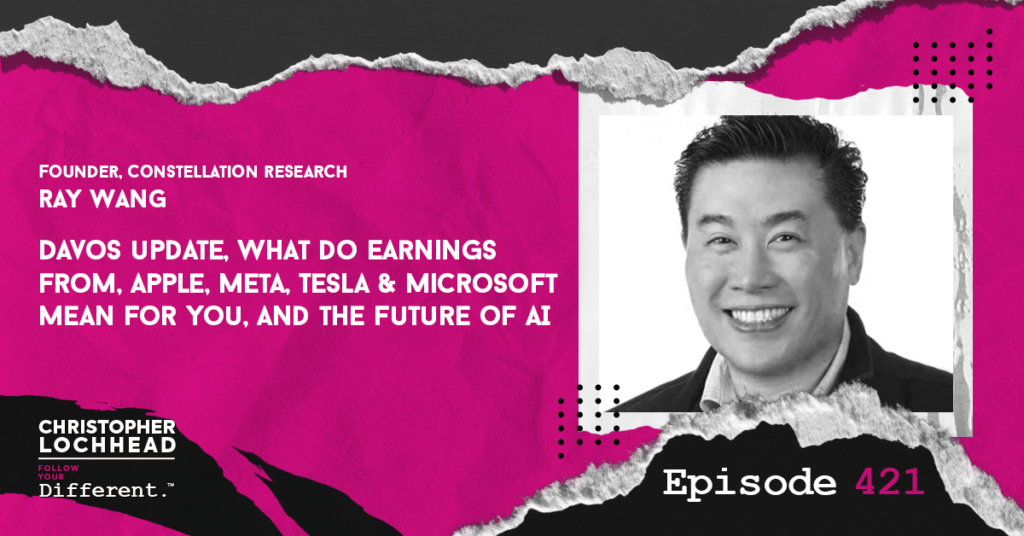
Podcast: Play in new window | Download (Duration: 45:52 — 31.5MB) | Embed
Subscribe: Apple Podcasts | Spotify | Pandora | RSS | More
Welcome to another episode of Christopher Lochhead: Follow Your Different, featuring the legendary Ray Wang. In this memorable conversation, Christopher and Ray dive deep into the latest developments shaping the world of technology, business, and careers. From dissecting recent tech earnings from giants like Apple, Meta, Tesla and Microsoft to sharing insights from Davos and contemplating the implications of AI for the future of work and entrepreneurship.
This episode delivers high-caliber analysis and practical takeaways for anyone navigating today’s rapidly evolving landscape.
You’re listening to Christopher Lochhead: Follow Your Different. We are the real dialogue podcast for people with a different mind. So get your mind in a different place, and hey ho, let’s go.
Lessons from Davos and the New Economic Realities
Returning from a bustling Davos, Ray Wang shares his observations on how global leaders and executives are tackling an era defined by uncertainty, rapid technology adoption and a relentless pursuit of efficiency. One of Ray’s core takeaways is the prevailing theme of “margin compression,” where even the world’s largest corporations are working harder than ever just to achieve modest growth. Companies are now measured by their ability to scale exponentially, as illustrated by India’s ISRO launching rockets at a fraction of NASA’s cost, fundamentally altering competitive dynamics across industries.
Ray explains that the rise of AI turbocharges this transformation by opening up “infinite possibilities.” Companies no longer just compete on physical or financial assets, but on their ability to harness vast data resources, quickly innovate and make sharp strategic choices about what problems to solve—and, crucially, what not to do. Privacy challenges, especially for companies like Apple, arise in this new era, making it difficult to deliver world-class AI solutions while maintaining rigorous data protection standards. Both Christopher and Ray emphasize that managing growth, inflation and investment are more complex than ever, with the U.S. outpacing much of the world in GDP growth, yet operating in a global environment rife with policy and market uncertainties.
AI, Tech Earnings, and the Rise of the New IPO Era
The conversation pivots to the massive investment and exuberance surrounding generative AI and tech infrastructure. Ray points out that while there are fears about overbuilding capacity or creating a circular funding loop among AI companies, there is still significant real opportunity. The current phase has seen enormous capital pour into building data centers and scalable AI platforms. Landmark IPOs from OpenAI, Databricks and others are expected to reshape the tech landscape. Despite market fluctuations and some outsized reactions to earnings, the fundamentals for big tech remain robust. Companies like Apple have solidified their status as luxury brands, even as others like Tesla and Meta retool and pivot to sustain long-term relevance and unlock new revenue streams such as robotics and energy.
At the structural level, venture capital itself is in flux. Many VC firms have become indistinguishable from private equity, constrained both by too much and too little available capital relative to the demands of today’s tech startups. The gap between small angel, family office, or solo GP funds and the mega funds has widened so much that the “middle” has all but disappeared. It is now entirely possible for one-person companies, through the leverage of AI and autonomous agents, to achieve scale and revenues previously thought impossible. Ray predicts it is likely we will see a single founder build a billion-dollar annual revenue company within the next five years, echoing the democratization and disruption that generative AI promises.
Building Legendary Companies and Careers in the Age of AI
Christopher and Ray close their discussion by exploring what all these rapid changes mean for leaders and individuals. For CEOs and entrepreneurs, the formula for thriving is clear but audacious. Leaders must design their companies to be fully autonomous and authentic, constantly reinventing their business as if they were attempting to disrupt themselves. Boards need to be stacked with people who grasp the new fundamentals: margin compression, exponential scale, and infinite possibilities brought by AI. Combining domain expertise with technical agility is more critical than ever, as the fusion of seasoned judgment and lightning-fast, innovative execution is where breakthroughs occur.
On a personal level, Ray stresses that knowledge and execution are becoming commodities, rapidly automated by advances in AI. To stay relevant, individuals must become “macro analysts,” adept at synthesizing big ideas and patterns, deeply immersed in experimenting with new technologies and surrounded by others who are passionate about their own crafts. The traditional playbooks for career building, education, and even family strategies are being rewritten in real-time. The U.S. faces global competition for talent and innovation, and entrepreneurial energy is no longer confined to Silicon Valley or New York. The nature of immigration, investment and even educational choices must be reconsidered for new generations. In a world where the location and structure of opportunity are shifting, only those who embrace change, foster diverse collaborations and pursue purpose will continue to define the next era of legendary achievement.
As both Christopher and Ray reflect, living and leading like Rob Burgess—embracing boldness, curiosity and authenticity—remains the path to being truly legendary in this rapidly changing world.
To hear more from Ray Wang and his updates on the world of Tech and AI, download and listen to this episode.
Bio
R “Ray” Wang (pronounced WAHNG) is the Founder, Chairman, and Principal Analyst of Silicon Valley based Constellation Research Inc. He co-hosts DisrupTV, a weekly enterprise tech and leadership webcast that averages 50,000 views per episode and authors a business strategy and technology blog that has received millions of page views per month. Wang also serves as a non-resident Senior Fellow at The Atlantic Council’s GeoTech Center.
Since 2003, Ray has delivered thousands of live and virtual keynotes around the world that are inspiring and legendary. Wang has spoken at almost every major tech conference. His ground-breaking bestselling book on digital transformation, Disrupting Digital Business, was published by Harvard Business Review Press in 2015. Ray’s new book about Digital Giants and the future of business titled, Everybody Wants to Rule the World will be released July 2021 by Harper Collins Leadership.
Wang is well quoted and frequently interviewed in media outlets such as the Wall Street Journal, Fox Business News, CNBC, Yahoo Finance, Cheddar, CGTN America, Bloomberg, Tech Crunch, ZDNet, Forbes, and Fortune. He is one of the top technology analysts in the world.
Links
Follow Ray Wang!
Website | Twitter | LinkedIn | Constellation Research | DisrupTV
We hope you enjoyed this episode of Christopher Lochhead: Follow Your Different™! Christopher loves hearing from his listeners. Feel free to email him, connect on Facebook, X (formerly Twitter), Instagram, and subscribe on Apple Podcast / Spotify!
420 How to Flourish with Daniel Coyle, NYT Best-selling Author of The Culture Code, on new book “Flourish: The Art of Building Meaning, Joy, and Fulfillment”
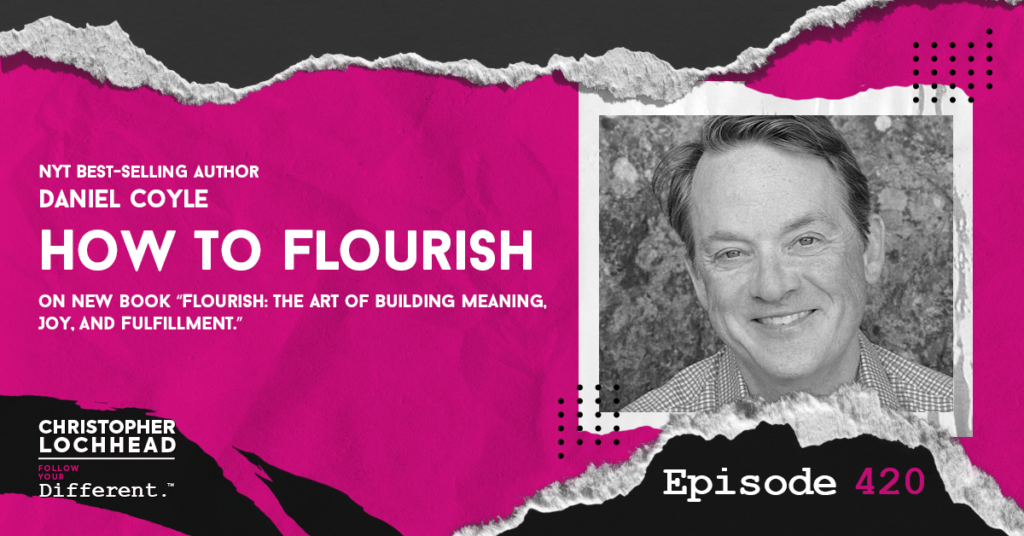
Podcast: Play in new window | Download () | Embed
Subscribe: Apple Podcasts | Spotify | Pandora | RSS | More
In a world overflowing with business content and quick-fix success formulas, authentic dialogue about what gives life meaning can feel rare. On this episode of Christopher Lochhead: Follow Your Different, we have a conversation with Daniel Coyle, bestselling author of “The Culture Code” and the new book “Flourish.”
We unpack why thriving individually and collectively goes far beyond achievements. Their dialogue serves as a blueprint for building a life and community that feels connected, alive, and meaningful.
You’re listening to Christopher Lochhead: Follow Your Different. We are the real dialogue podcast for people with a different mind. So get your mind in a different place, and hey ho, let’s go.
Beyond the Mountain: What Happens After Success?
For many, life is a climb toward results: career milestones, fame, or financial rewards. Both Lochhead and Coyle share how, after reaching some form of the summit, people often ask “What’s this all for?”
The answer, according to years of research on happiness and human development, isn’t another achievement. Instead, life satisfaction comes from meaningful relationships. Despite this, Western culture pushes us to optimize, perform, and automate, treating life and business as machines instead of thriving ecosystems. To flourish means to recognize life as something to be tended like a garden, not a hill to conquer.
The Paradox of Results and Meaning
High performers often value discipline, drive, and outcome; the thrill of legendary results. Coyle acknowledges the paradox: results are important, but without serving something higher, they feel empty. Achieving big goals can even hollow out life if not connected to deeper values or service beyond oneself.
True flourishing involves aligning your pursuits with something greater and knowing what you want to exist in the world even if you’re not there. As Coyle puts it, life’s best moments often come when “you kind of vanish” into connection, contribution, or flow: whether with people, ideas, or experiences.
Cultivating Flourishing in Daily Life
If flourishing is rooted in shared, joyful, and meaningful growth, how can we cultivate it amid daily pressures? Coyle’s advice is to start small and intentionally reflect on where you already feel most resonant, moments when you lose yourself in work, play, or connection. Track these periods and aim to create more of them. Meaningful relationships come from deep questioning and mutual investment, not from perfect routines or solitary habits. Prioritize the “animate” parts of your life: the conversations, surprises, and even the messiness of real relationships, which are hallmarks of flourishing communities and partnerships. Ultimately, flourishing is mutual: you cannot thrive alone, and your aliveness helps those around you come alive too.
The message is clear. Achievements matter, but without connection and mutual flourishing, they become hollow victories. Designing a flourishing life is not only possible but necessary for real fulfillment, and it starts with tuning into what gives your days meaning and builds authentic relationships along the way.
To hear more from Daniel Coyle and how to flourish in business and daily life, download and listen to this episode.
Bio
Daniel Coyle is a bestselling author and leading voice on peak performance, talent development, and organizational culture. He is best known for The Talent Code, The Culture Code, and The Little Book of Talent, which explore how individuals and teams achieve extraordinary results.
Through immersive research with elite sports teams, businesses, and creative organizations, Coyle uncovers the habits and environments that spark learning, trust, and sustained excellence. His work translates complex science into practical, actionable insights.
Coyle’s writing has been featured in The New York Times, The Wall Street Journal, and Harvard Business Review. As a sought-after speaker, he helps leaders build cultures that drive growth, resilience, and long-term success.
Links
Follow Daniel Coyle!
Daniel’s Blog | LinkedIn | Facebook
We hope you enjoyed this episode of Christopher Lochhead: Follow Your Different™! Christopher loves hearing from his listeners. Feel free to email him, connect on Facebook, X (formerly Twitter), Instagram, and subscribe on Apple Podcast / Spotify!
419 The Secret to Success In 2026 Is Hiding in Plain Sight (LinkedIn, Lenny & Noam Just Proved It) | Category Pirates
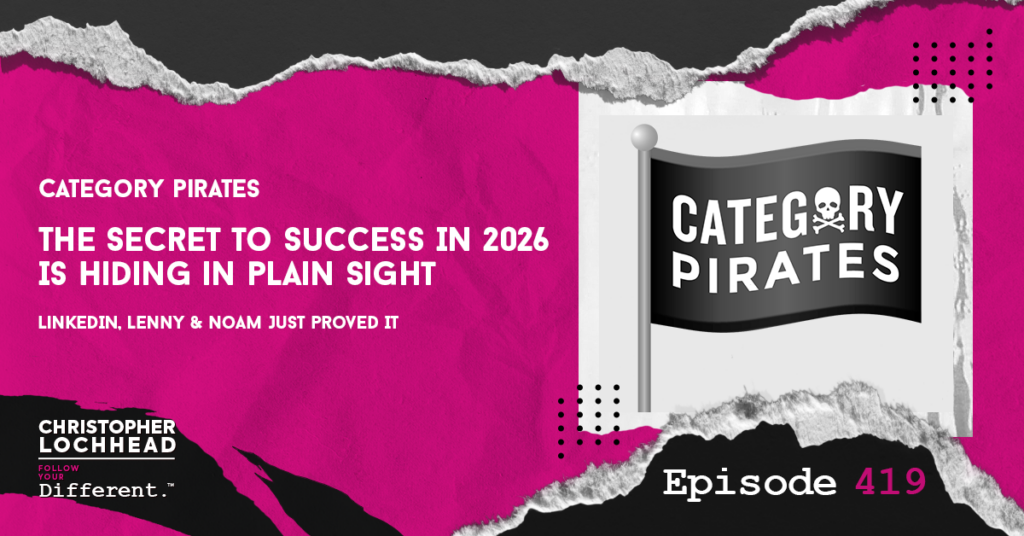
Podcast: Play in new window | Download () | Embed
Subscribe: Apple Podcasts | Spotify | Pandora | RSS | More
On this episode of Christopher Lochhead: Follow Your Different, we sail with the Category Pirates to unpack why career success in the coming years hinges on moving beyond using AI as just another productivity tool and embracing it as a co-founder and thought partner. The insights aren’t just for techies or founders, they are relevant for anyone who wants to future-proof their career and unlock uncommon leverage in a world being remade by generative AI. As we find ourselves deep in the rise of artificial intelligence, the ways people define their careers and generate value are evolving rapidly. This episode dives into two key research reports that uncover a powerful trend shaping the very foundation of work and entrepreneurship. You’re listening to Christopher Lochhead: Follow Your Different. We are the real dialogue podcast for people with a different mind. So get your mind in a different place, and hey ho, let’s go.LinkedIn and Lenny: Two Data Sets Signal a Seismic Shift
Very recently, two independent research efforts converged on a striking insight. LinkedIn, with its enormous database tracking millions of real career moves, revealed the fastest-rising roles: founder, AI engineer, independent advisor, and AI strategist and consultant. The title “founder” alone is up 60 percent year-over-year and has nearly tripled since 2022. This isn’t just a startup wave; it’s a broad career escape pattern: a mass migration away from conventional jobs towards agency, creativity, and ownership. Meanwhile, the renowned Lenny Rachitsky, together with Noam Segal, surveyed 1750 tech workers who are already deep in the trenches of AI adoption. Their data not only reinforced the LinkedIn findings but made something even clearer. The workers getting the greatest value from AI weren’t simply using it to write faster emails or crank out code a bit quicker. Founders (those who saw themselves as owners) were extracting exponentially more value, driving higher ROI, more time savings, and better work quality by leveraging AI not just to improve execution, but to reimagine strategy and decision making.Moving Beyond Tool: AI as Your Career’s Co-Founder
What’s the real difference between the “founders” in these studies and many other professionals? It’s not intelligence or technical skill. It’s mindset and operational practice. Founders use AI as a co-founder rather than a generic tool. They treat their careers as if they are companies, and AI is their essential collaborator. While engineers, managers, and designers may use AI to automate tests, generate presentations, or speed up research, founders leverage AI for decision making, vision, and strategic moves. The approach goes even deeper. Top performers are building their own custom AIs, trained on their unique intellectual property: their notes, writing, frameworks, and research. This isn’t about using a public ChatGPT prompt or borrowing from generic knowledge bases. The new class of “creator capitalists” construct a persistent AI thought partner that challenges their assumptions, remembers everything they’ve produced, and becomes an always-on collaborator for new ideas, product invention, and critical thinking. At Category Pirates, for example, their internal “Lucy” AI has become the sharpest mind on their team: always ready to spark new value, and even surpassing the domain expertise of its human creators in key areas.From Execution Labor to Creator Capitalists: The New Career Divide
This transformation signals a far deeper change in the job market. The traditional divide of technical versus non-technical roles, or employed versus unemployed, is becoming less relevant. Instead, the real split now is between execution labor and creator capitalists. AI is driving the cost of accessing knowledge and automating rote tasks toward zero. Execution labor (those who focus on applying known inputs to familiar problems) can use AI to go faster but are still replaceable. In contrast, creator capitalists use AI to design new futures, develop judgment, and build intellectual capital that compounds over time. The LinkedIn and Lenny data make it clear: career value is migrating from mere knowledge and execution to originating new insight and value. The people outpacing the pack aren’t simply working harder or faster. They’ve redrawn the boundaries of their roles, shifted from employee to owner in mindset, and made AI their partner in creation, decision-making, and value extraction. The future belongs to those who build and train their own custom AIs, transforming themselves into categories of one, and compounding their expertise every single day. If you want to move from knowledge worker to creator capitalist, and from user to AI collaborator, the playbook is already available and the evidence is hiding in plain sight. The choice is yours: stick with generic tools and returns, or invent the future side by side with your own AI co-founder. If you want to hear more from the Founding Category Pirates themselves, download and listen to this episode.Links
Check out the latest Category Pirates posts and discussions about The Secret to Success in 2026! Want to join in the conversation? Check out the Category Pirates newsletter and feel free to share your thoughts with the crowd! We hope you enjoyed this episode of Christopher Lochhead: Follow Your Different™! Christopher loves hearing from his listeners. Feel free to email him, connect on Facebook, X (formerly Twitter), Instagram, and subscribe on Apple Podcast / Spotify!418 Frontline Diplomacy: Israel’s Deputy Minister of Foreign Affairs Sharren Haskel on Iran, Gaza, and Hope for the Region
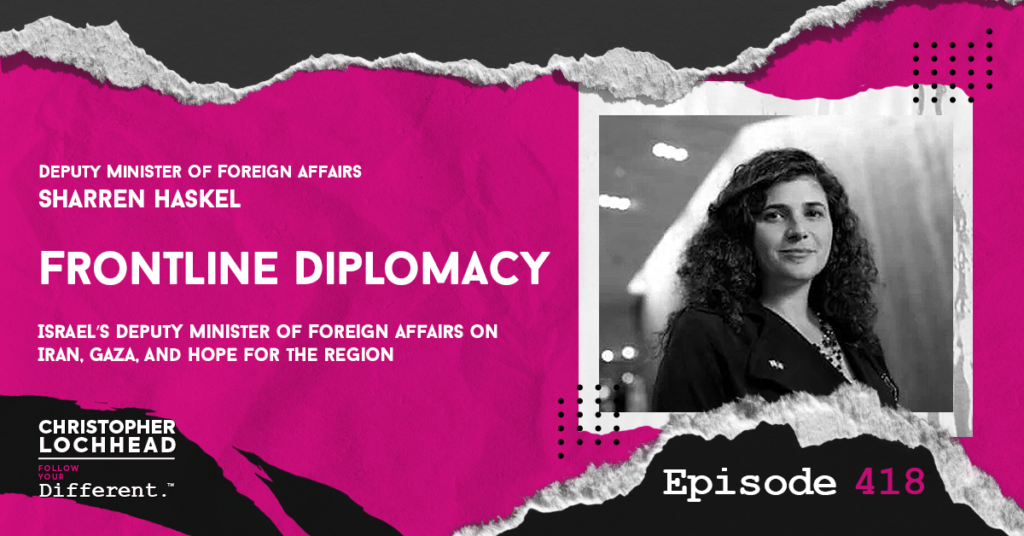
Podcast: Play in new window | Download (Duration: 1:18:01 — 53.6MB) | Embed
Subscribe: Apple Podcasts | Spotify | Pandora | RSS | More
On this episode of Christopher Lochhead: Follow Your Different, Israeli Deputy Minister of Foreign Affairs Sharren Haskel joins us to discuss the rapidly evolving regional dynamics, the impact of October 7th, and the broader implications for Western democracies facing the challenges posed by radical ideologies and political inaction.
You’re listening to Christopher Lochhead: Follow Your Different. We are the real dialogue podcast for people with a different mind. So get your mind in a different place, and hey ho, let’s go.
Sharren Haskel on the Rising Extremism and Western Political Paralysis
Deputy Minister Haskel’s personal story and her reflections on recent attacks in places like Australia, the UK, and across Europe, reveal a growing concern about the unchecked rise of extremism and anti-Semitism in historically tolerant Western societies. Drawing on her years in Australia and the tragedy at Bondi Beach, Haskel expressed her deep shock and frustration over the persistent inaction by local governments in the face of escalating hate crimes against Jewish communities.
According to Haskel, the roots of this problem go far beyond foreign policy. She attributes much of the inaction to internal politics and the pursuit of re-election, wherein politicians seek to appease immigrant communities that often arrive with deeply ingrained cultural prejudices, including anti-Semitism, from the Middle East. She criticized governments in Australia, Canada, and the UK for failing to enforce clear boundaries against hate speech and violent incitement. Instead, she argued, there has been a pattern of rhetorical condemnation without concrete protective measures, resulting in what she described as an environment where radicalization can flourish unchecked and Jewish communities are left vulnerable.
The October 7th Attack and Israel’s Existential Resolve
The conversation turned to the profound impact of October 7th, 2025, an event described as the largest and most brutal attack on Jews since the Holocaust. Haskel recounted the collective mourning and soul-searching that swept Israel, as well as a wave of determination to prevent such atrocities from ever happening again. For Haskel and many Israelis, the attack was not only an unspeakable tragedy but also a moment of disappointment in their generation’s promise to uphold the creed of “never again.”
Yet, from the aftermath of horror emerged a powerful sense of resolve. Lochhead remarked that Israel appeared stronger after the attack, not weaker. Haskel recounted how, rather than fleeing, tens of thousands of Israelis and Jews from around the world returned to the country to support its defense. She described this as a pivotal moment, a ‘make it or break it’ scenario in which Israel had to repel attacks from multiple fronts—Hamas, Hezbollah, and hostile forces backed by Iran from Syria, Iraq, and Yemen. The attacks were not only aimed at Jews but also targeted Christians, Muslims, and citizens from various nations, further underscoring the broader threat posed by radical groups.
Iran’s Uprising and the Global Stakes for Freedom
As the Iranian regime confronted an unprecedented uprising (sparked by years of repression, economic hardship, and the regime’s violent response), international attention intensified. Haskel spoke of thousands of Iranians killed or missing, the regime shutting down the internet, and the desperate situation faced by protesters, many of whom were being shot or abducted in broad daylight. Despite threats from Tehran aimed at both Israel and the United States, the Israeli government has maintained a cautious but attentive stance, recognizing both the risks and opportunities presented by the unrest.
For Haskel, the Iranian regime stands as the foremost threat to global freedom, having long exported terror and repression while suppressing its own people. She called for solidarity among all who value democracy, emphasizing that the fall of the regime would be a victory for human rights, women’s rights, and the pursuit of liberty everywhere. Despite the cautious approach taken by Israel and its allies, she noted that the most vital pressure must come from within Iran, recalling the historic example of the Shah, who fled under international but primarily popular pressure.
The world now stands on the verge of profound change, as old certainties crumble and new alliances and realities emerge. Haskel’s message for Iran’s protesters was clear: though international support matters, lasting liberation rests on the courage and resilience of the Iranian people themselves. The lesson for the broader international community is that the defense of freedom requires vigilance, unity, and unflinching resolve, both against external enemies and the creeping dangers within democratic societies.
As the fate of the Iranian uprising, and indeed the region, hangs in the balance, the stakes extend far beyond the Middle East. The choices made by leaders and citizens alike will shape the future not only of a region in turmoil but of the democratic world as a whole.
To hear more from Sharren Haskel and the current state of affairs in the world, download and listen to this episode.
Bio
Sharren Haskel is an Israeli politician serving as Deputy Minister of Foreign Affairs since 2024. She has been a member of the Knesset since 2015, initially with Likud, later joining New Hope and National Unity.
A combat veteran of the IDF’s Border Police during the Second Intifada, she previously worked as a veterinary nurse in Australia.
Haskel holds a degree in political science and international relations. Known for her liberal-conservative stance, she champions free markets, civil liberties, and environmental causes. She is a prominent advocate for Israel’s international relations and UNRWA reform.
Links
Connect with Sharren Haskel
We hope you enjoyed this episode of Christopher Lochhead: Follow Your Different™! Christopher loves hearing from his listeners. Feel free to email him, connect on Facebook, X (formerly Twitter), Instagram, and subscribe on Apple Podcast / Spotify!
417 How Joe Pine Built A Business Around His Intellectual Capital
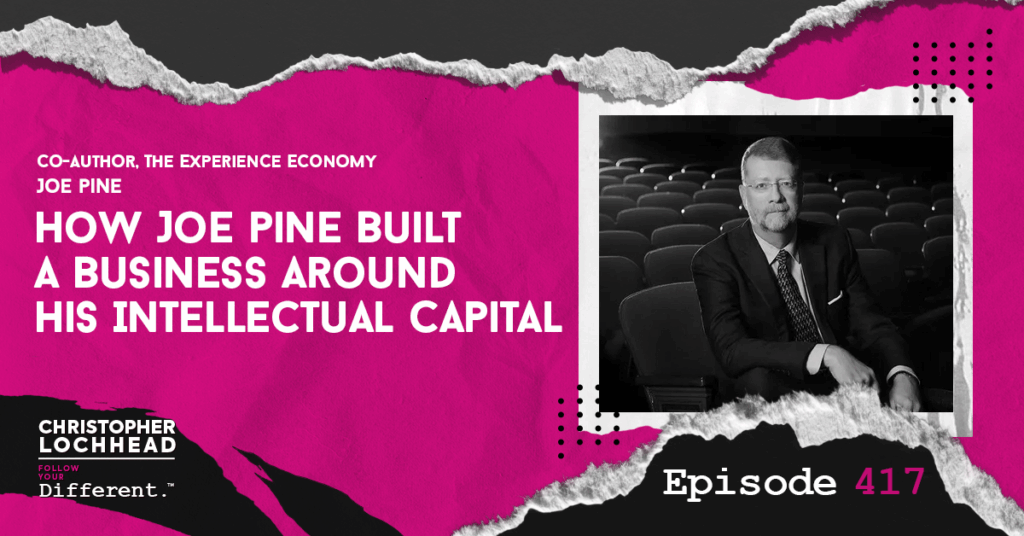
Podcast: Play in new window | Download (Duration: 1:01:38 — 42.3MB) | Embed
Subscribe: Apple Podcasts | Spotify | Pandora | RSS | More
On this episode of Christopher Lochhead: Follow Your Different, we sit down with business thinker Joe Pine, the legendary co-author of “The Experience Economy,” for an in-depth conversation about building a career around unique ideas.
Joe Pine shares insights from his early days as a self-described nerd at IBM to his role in shaping the field of mass customization and ultimately designing a business that made him stand out as a category of one. The discussion moves fluidly from personal transformation to the sweeping changes he helped pioneer in business, and what it means to thrive as a creator capitalist in today’s rapidly changing world.
You’re listening to Christopher Lochhead: Follow Your Different. We are the real dialogue podcast for people with a different mind. So get your mind in a different place, and hey ho, let’s go.
Finding a Different Path: From Palo Alto to Publishing with Harvard
Joe Pine’s journey began in Palo Alto during the era of the Arpanet, with technology in his blood and a passion for applied mathematics. Pine joined IBM in 1980, at its peak as arguably the most desirable company for ambitious technologists. Despite a technical start, he found himself increasingly drawn to management, strategy, and the world of business ideas. His trajectory changed dramatically when IBM sent him to MIT for a master’s in the management of technology. There, Pine encountered Stan Davis’s concept of “mass customization” and felt a lightning bolt of inspiration.
Deciding to turn his MIT thesis into a book, Pine landed a contract with Harvard Business School Press. The credential of publishing with Harvard, he notes, was a powerful stamp of intellectual rigor. As he recalls, “Harvard puts its stamp on it, says this is intellectually rigorous. This is a good book. This ought to be out in the world, and we want to publish it.”
Joe Pine on Leaping from Employee to Icon, and Creating the Experience Economy
With his first book in hand, Pine found himself at a crossroads. The culture at IBM was changing, and a timely severance package offered him a financial cushion to take a risk. Encouraged by thought leaders he admired, he struck out on his own. Initially, IBM remained his primary client, but Pine quickly built a reputation for leading-edge thinking and collaborating with other luminaries like Don Peppers and Jim Gilmore.
The launch of “The Experience Economy” marked a turning point, not just for Pine, but for the business landscape itself. He didn’t merely spot a trend or invent a new buzzword; he named and framed a fundamental shift in the economy’s fabric. “We didn’t identify a fad, but a fundamental change in the fabric of the economy. And if it is a change in the economy, then it is always going to go like that, right? Until something surpasses it and it starts to go down as happened with commodities and goods and services.”
The central idea that businesses must stage memorable experiences to remain relevant only grew more compelling over time, with Pine’s frameworks gaining more relevance as the digital age accelerated.
Transformation and Identity in the Age of AI
As the episode moves to the present, Pine discusses how transformation, both personal and organizational, is ultimately about changing identity. He credits much of his own success to an ability to recognize patterns and develop frameworks to describe and prescribe changes in business. Pine’s recent work, including his Substack and newest book, explores not just customer experience but transformation itself, emphasizing that “all transformation is identity change.”
The conversation turns to AI and the breaking waves of change it represents for businesses today, paralleling Pine’s earlier identification of evolving economic eras. He sees transformation as most successful when companies or individuals are willing to fundamentally shift who they are, not just what they do. “The identity issues there are paramount because who you think you are often stops you from being able to do these things because it would change who you are so much.”
Joe Pine believes that in the new world shaped by AI, those who can shed old identities and truly reinvent themselves—much as he did when he left IBM—will be the ones to define the next era. The lesson for aspiring creator capitalists is clear: the greatest value comes not only from unique ideas but also from the courage to turn those ideas into new identities, new categories, and new realities.
To hear more from Joe Pine and how he built a business with his Intellectual Capital, download and listen to this episode.
Bio
Joe Pine is a renowned author, speaker, and management advisor best known as the co-author of The Experience Economy, a groundbreaking book that reshaped how businesses create value. His work introduced the concept that companies must orchestrate memorable experiences to remain competitive in an evolving marketplace.
With deep expertise in innovation and customer experience design, Joe helps organizations around the world architect differentiated experiences that drive growth and loyalty. He has worked with leading global brands across industries from retail and hospitality to healthcare and technology.
Joe is also a sought-after keynote speaker and co-founder of Strategic Horizons LLP. His insights continue to influence leaders seeking to transform the way they engage customers.
Links
Connect with Joe Pine!
We hope you enjoyed this episode of Christopher Lochhead: Follow Your Different™! Christopher loves hearing from his listeners. Feel free to email him, connect on Facebook, X (formerly Twitter), Instagram, and subscribe on Apple Podcast / Spotify!
416 The Rise of the Creator Capitalist with Christopher Lochhead | The Podcast Interview Marketing Show

Podcast: Play in new window | Download (Duration: 47:27 — 32.6MB) | Embed
Subscribe: Apple Podcasts | Spotify | Pandora | RSS | More
On this episode of Christopher Lochhead: Follow Your Different, Christopher yielded his host chair as he joined Tom Schwab in The Podcast Interview Marketing Show to discuss the rise of the Creator Capitalist.
Through their dialogue, Christopher Lochhead and Tom Schwab explored why the foundational model of “knowledge work” is swiftly becoming obsolete in the age of artificial intelligence. More importantly, they charted a path forward for professionals and entrepreneurs seeking to not just survive but thrive by transitioning from knowledge workers to what Lochhead calls “creator capitalists.”
This episode unpacked how AI is upending the value of existing knowledge, why declaring and differentiating your value matters more than ever, and how podcasts exemplify and enable the new rules for standing out in a commoditized world.
You’re listening to Christopher Lochhead: Follow Your Different. We are the real dialogue podcast for people with a different mind. So get your mind in a different place, and hey ho, let’s go.
AI and the Death of the Knowledge Worker
A core theme throughout the conversation is Lochhead’s assertion that the traditional knowledge worker is now on an “already dead” trajectory. Echoing Peter Drucker’s concept from seventy years ago, Lochhead dissected the evolution of knowledge work: those who acquire valuable knowledge and are paid to apply it to achieve outcomes.
For decades, professions like law, medicine, and accounting thrived on this value proposition. But as Lochhead put it, “AI makes the value of existing knowledge closer to zero every day, and it makes the ability to apply existing knowledge easier, cheaper, and closer to zero.” As machine learning and generative AI like ChatGPT and Claude can instantly synthesize and apply troves of information, merely applying knowledge is no longer a competitive edge.
In Lochhead’s words, “If you rely solely on applying existing knowledge to get paid, you’re already behind the curve.” The world’s next wave of success stories won’t be those who can recite best practices or historical information; instead, it’ll be pioneers who create entirely new categories, products, and perspectives.
Declaring and Defending Your Value in a Commoditized Marketplace
This paradigm shift has profound implications for how expertise and content are valued. Schwab and Lochhead explore the necessity, not just of creating new value, but of unmistakably declaring it to the market. Lochhead’s release of his book “Lightning Strike Marketing”—priced defiantly at $100—became a case in point. The rationale wasn’t greed, but a strategic effort to defend the book’s value and signal that it’s not merely recycled or commoditized information. Lochhead observed, “Unless you declare you are valuable, you will be devalued by AI.”
The traditional model, where business books have hovered at the $25 mark for decades, fails to align pricing with the value delivered and only invites further commoditization. By staking out a bold price point, the book became a “lightning strike” in its own right. The move generated word of mouth, forced a choice for buyers, and ultimately achieved bestseller status on Amazon for global marketing books.
At the heart, the message is clear: creators who want to lead must not only generate differentiated intellectual property but stand firm against the eroding forces of commoditization. “Better invites a comparison; different forces a choice,” Lochhead added, marking the essential blueprint for becoming a category of one.
Podcasts and Category Design: The New Playground for Net New Value
A recurring motif, interwoven through both Christopher Lochhead’s and Tom Schwab’s journeys, is the unique power of podcasts as both a proving ground for new ideas and a channel for building “relationship and reputation capital.” In contrast to AI-generated summaries or formulaic blog posts, podcasts uniquely foster authentic, serendipitous dialogue between real human beings.
“Podcasting is the only medium left for authentic dialogue,” said Lochhead, outlining how the intimacy and depth of podcasts allow guests and hosts to move past talking points and actually “jam” with ideas—testing, shaping, and evangelizing bold, new categories of thought. This aligns perfectly with the creator capitalist mindset: “The best podcast guests aren’t repeating what the market already knows. They’re creating net new value.”
Podcasting democratizes idea distribution. With lower barriers to entry, anyone, regardless of formal credentials, can articulate a vision for the future, test it in real time, and claim a position before the mainstream even knows a new category exists. For entrepreneurs, creators, and executives, podcast interviews have become a laboratory and a loudspeaker for the non-obvious, the different, and the valuable.
To hear more of the exchange between Tom Schwab and Christopher Lochhead, download and listen to this episode.
We hope you enjoyed this episode of Christopher Lochhead: Follow Your Different™! Christopher loves hearing from his listeners. Feel free to email him, connect on Facebook, X (formerly Twitter), Instagram, and subscribe on Apple Podcast / Spotify!
415 Out Of The Existing Market Trap with Christopher Lochhead
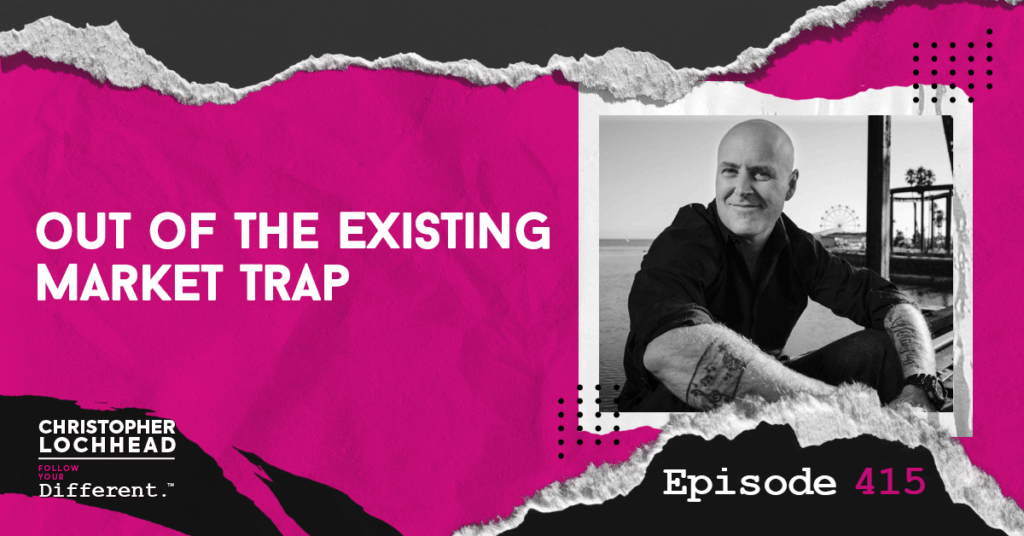
Podcast: Play in new window | Download (Duration: 34:40 — 23.8MB) | Embed
Subscribe: Apple Podcasts | Spotify | Pandora | RSS | More
Christopher Lochhead, the renowned “Godfather of Category Design,” recently took the stage at the Constellations Connected Enterprise 2025 conference and delivered a blistering wake-up call to every business leader, entrepreneur, and innovator hoping to surf the current wave of AI disruption.
Far from celebrating the AI gold rush, Lochhead warned that almost everyone is about to repeat the same mistakes of the past, chasing after existing markets, adding AI features like “copilots” or assistants, and calling it innovation. Drawing from his decades of expertise and path-breaking research, He then laid out a blueprint for actually leveraging AI for exponential value: it’s about category design, not incremental improvement.
Here are three powerful takeaways from his masterclass that every forward-thinking leader needs to know.
You’re listening to Christopher Lochhead: Follow Your Different. We are the real dialogue podcast for people with a different mind. So get your mind in a different place, and hey ho, let’s go.
Chasing “Better” Dooms You to Mediocrity
Lochhead’s central thesis is as provocative as it is true: companies that use AI to make existing products just a little better are doomed to fail. He calls this the “existing market trap.”
Instead of designing the future, most businesses simply bolt AI onto their old offerings, thinking it will make them competitive. But “if your strategy involves simply bolting on an AI assistant or copilot, you’re making a pussy move and you’re fucked.” Lochhead points out that companies making this mistake are chasing a market that’s already been designed by someone else. And in those markets, 76% of all the value goes to the category king (think OpenAI with ChatGPT). The rest fight for scraps, regardless of whether their AI copilot is a little nicer, faster, or more user-friendly.
Winning is About Creating the New, Not Improving the Old
The path to massive value in the AI era lies in doing what legends like Sam Altman, Jensen Huang, and Steve Jobs did: creating entirely new categories that didn’t exist before. Lochhead illustrates this with both tech giants and quirky startups.
He jokes about how Liquid Death became a force in the water business not by making better bottled water, but by launching “canned water”; an entirely new way to experience an old product with legendary branding and a distinct point of view. The same lesson holds for technology: “Different wins, better loses.” Lochhead encourages companies to listen to the language they use; calling your new AI product an “assistant” or “copilot” puts it in the sidecar, not the driver’s seat. In contrast, declaring your invention as a new category not only reframes the problem, but magnetizes the future (as when OpenAI refused to call its core product a database, instead introducing the “large language model”).
The Courage to Create: Why Category Design Demands Boldness
Lochhead doesn’t sugarcoat the difficulty of this path. Category design requires courage: “Grow a set of balls,” he tells the audience when asked how to nurture a creator’s mindset. This isn’t reckless advice; it’s a recognition that in an AI-powered economy, the value of existing knowledge is collapsing toward zero.
The knowledge worker, as Peter Drucker defined it, is being replaced by the knowledge contained within AI itself. The only safe (and rewarding) place is at the edge, inventing net new knowledge and value. In other words, creating the future instead of merely extending the present. Lochhead challenges all of us: “Do you really want to spend the last however many years of your career making the status quo incrementally better? Or do you want to spend whatever’s left of your work life making a massive material difference?”
To hear the full episode from the man himself, download and listen to this episode.
We hope you enjoyed this episode of Christopher Lochhead: Follow Your Different™! Christopher loves hearing from his listeners. Feel free to email him, connect on Facebook, X (formerly Twitter), Instagram, and subscribe on Apple Podcast / Spotify!
414 The AI Future with John Donovan of AT&T, the Man who launched the iPhone
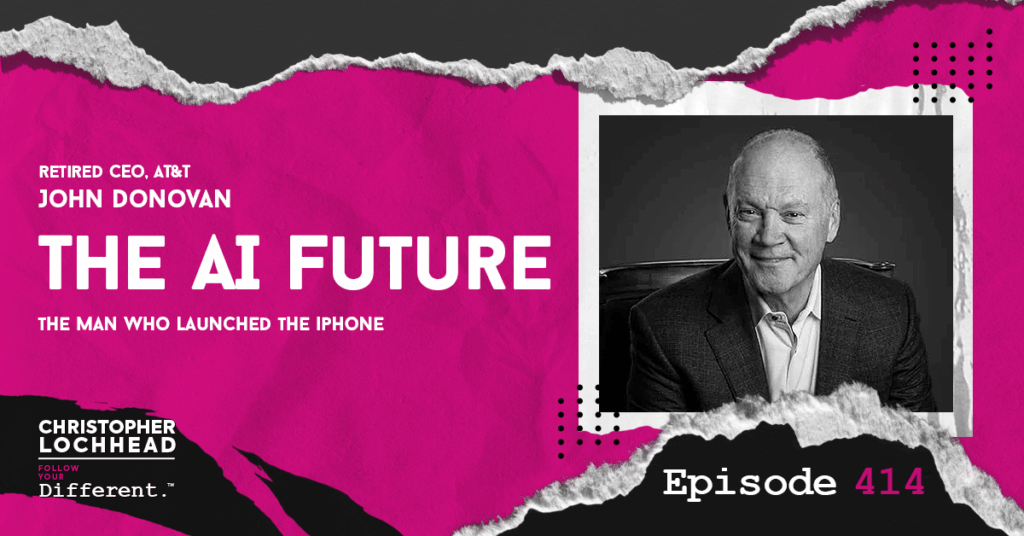
Podcast: Play in new window | Download (Duration: 1:18:59 — 54.2MB) | Embed
Subscribe: Apple Podcasts | Spotify | Pandora | RSS | More
In this episode of Christopher Lochhead: Follow Your Different, we are treated to a rare dialogue with John Donovan, renowned technology executive and board member, whose career has spanned transformative eras at AT&T and who continues to shape the strategies of some of the world’s biggest companies.
This conversation moves from leadership lessons around innovation and timing, through the current AI revolution and its economic implications, to personal reinvention in the face of relentless technological change.
You’re listening to Christopher Lochhead: Follow Your Different. We are the real dialogue podcast for people with a different mind. So get your mind in a different place, and hey ho, let’s go.
Leading through Technology and Perfect Timing
John Donovan shares candid insights about what it truly takes to lead technology for corporations at massive scale. He highlights that while choosing the right technology is challenging, selecting the right time to invest and deploy is even more crucial.
Drawing from his stewardship of AT&T during pivotal events, including the company’s exclusive deal with Apple for the first iPhone, Donovan explains the delicate balance between being too early, which leads to overspending, and being too late, which risks losing market leadership. He stresses the necessity of a structured process and assembling trusted teams to ensure efficient and impactful execution. This approach, he maintains, applies as much to revolutionary events of the past like the smartphone era as it does to today’s accelerating world of artificial intelligence.
The New Industrial Revolution: AI’s Economic and Organizational Impact
A major theme of the conversation revolves around the unprecedented buildout of infrastructure and investment occurring in AI. Donovan sees AI as the dawn of a new industrial age: one that, for the first time, is manufacturing intelligence itself. He explains that the billions being spent on infrastructure, real estate, and hardware underpin a transformation with no real historical precedent.
With AI attributed to fueling a significant portion of current GDP growth, Donovan believes that while the hype is justified, it’s still early days. Like the early years of the iPhone, when supporting infrastructure lagged behind exponential demand, today’s rapid investment in AI is setting the groundwork for productivity and business model innovation across industries.
The conversation touches on how traditional organizational roles and entire sectors are preparing for disruption; category leaders are poised to emerge quickly, and those companies that cannot adapt may not survive.
Reinventing Leadership and the Rise of the Creator Capitalist
Donovan offers a personal take on how the pace of change is shifting what it takes to be a successful executive. He predicts that in the near future, the average age of top industry CEOs will drop significantly, as the new environment favors younger leaders who are native to emerging technologies. Experience, he suggests, is being surpassed in value by competency and the capacity to continually self-educate and reinvent oneself.
Expanding on the evolution of work itself, Donovan aligns with Christopher’s view that we are moving beyond the traditional “knowledge worker” into an era where net new knowledge creation and leveraging AI to build new value will define career success. This creator-driven approach requires not just technical skill, but also imagination and the courage to challenge existing processes.
As AI increasingly automates repetitive and procedural tasks, human creativity in integrating and orchestrating these new tools will become the key differentiator across all fields.
To hear more from John Donovan and the man who launched the iPhone, download and listen to this episode.
Bio
Retired Chief Executive Officer of AT&T Communications, LLC, a wholly-owned subsidiary of AT&T Inc. John Donovan served as CEO from August 2017 until his retirement in October 2019.
He was Chief Strategy Officer and Group President of AT&T Technology and Operations from January 2012 through August 2017, and Chief Technology Officer of AT&T Inc. from April 2008 through January 2012.
He has served on the board of directors of Palo Alto Networks, Inc. since 2012 and was a member of the President’s National Security Telecommunications Advisory Committee from 2019 to 2023.
Link
Follow John Donovan!
We hope you enjoyed this episode of Christopher Lochhead: Follow Your Different™! Christopher loves hearing from his listeners. Feel free to email him, connect on Facebook, X (formerly Twitter), Instagram, and subscribe on Apple Podcast / Spotify!
413 How to Future-Proof the Next Generation with Ted Dintersmith
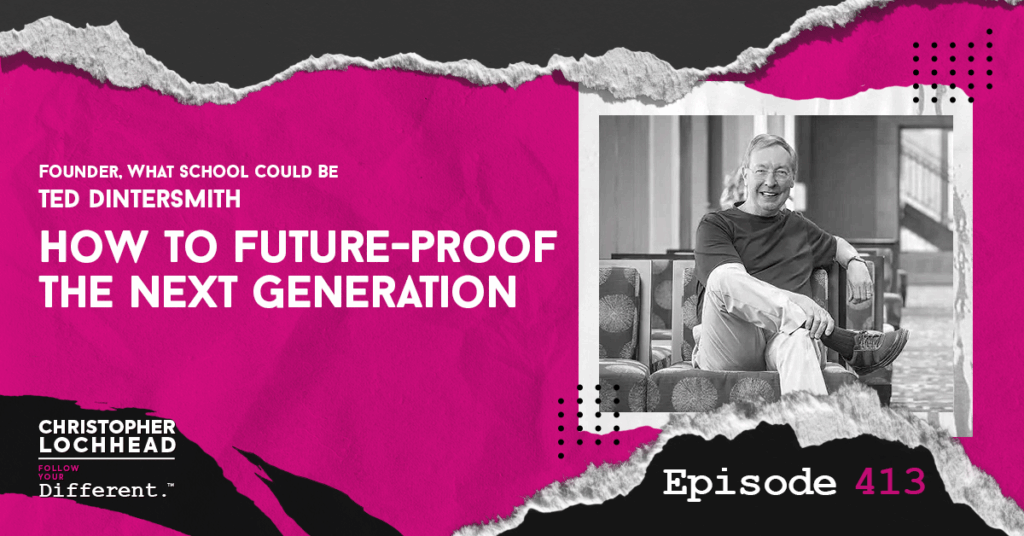
Podcast: Play in new window | Download (Duration: 1:23:12 — 57.1MB) | Embed
Subscribe: Apple Podcasts | Spotify | Pandora | RSS | More
If you’ve ever wondered why so many high school graduates seem ill-prepared for life in the real world, you aren’t alone. On this episode of Christopher Lochhead: Follow Your Different, we have a powerful conversation with education innovator Ted Dintersmith where the broken state of America’s education system is laid bare, and a refreshingly practical vision for the future is explored.
The discussion, centered on Ted’s new documentary “Multiple Choice,” makes a compelling case for reimagining high schools as launchpads for life, not just college admissions. As Ted puts it, “Imagine if the purpose of school were to prepare kids for life instead of standardized tests.” It’s a simple idea with revolutionary implications.
You’re listening to Christopher Lochhead: Follow Your Different. We are the real dialogue podcast for people with a different mind. So get your mind in a different place, and hey ho, let’s go.
Ted Dintersmith on the Cost of Standardization
In today’s high-pressure academic environment, schools have become laser-focused on standardized testing and college prep at the expense of real-world readiness. Ted Dintersmith is unflinching in his critique: “You hold people accountable to test scores. What are they going to do? They’re going to do test prep. And I think it’s damaging the futures of millions and millions of kids.” The impact is startling. Curiosity, creativity, and a sense of purpose are “crushed”, replaced by a relentless treadmill of test drills and application padding.
What’s more, society has paradoxically managed to “make people less capable at older and older ages.” Where previous generations might have been working, serving in the military, or starting their own ventures in their teens, many of today’s young adults struggle to launch. The root, according to Ted , is a model of schooling stuck in the late 19th century, one designed for a world of rote tasks, not the dynamic, creative economy of today. “We’ve gone from 99% of the jobs being ‘here’s your assignment, do it’ jobs to basically close to 0%. Now we need people to create and invent their path forward,” Ted explains. But our schools, he laments, “put that into a meat grinder” that discourages independent thought and problem-solving.
Winchester’s Innovation Center: Real-World Learning for Every Student
Perhaps the most hopeful moment in the conversation is Ted Dintersmith’s description of the Innovation Center in Winchester, Virginia: a school that’s rewriting the rules. There, every student, regardless of their academic track, participates in hands-on, career-oriented learning. From carpentry and welding to health care and artificial intelligence, the center offers a real taste of practical skills and modern technologies.
What sets Winchester apart is that this isn’t a program for a select few. “Every kid is spending healthy amounts of their high school time in there, in the Innovation Center,” Ted shares, highlighting how this all-in approach bridges the gap between vocational and academic pathways. Importantly, college-bound students benefit, developing resilient, adaptable skills alongside their career-focused peers.
“If a kid was at a school and they optionally took welding instead of AP chemistry, an elite college would turn them down… But here, because that’s what all the kids do, they say, ‘Oh, well, they kind of had to do it. I can’t really ding them for that,’”
– Ted Dintersmith
The results are telling. Students who might have once been written off as “suboptimal” are thriving. College applicants stand out with compelling stories of real achievement. And, perhaps most importantly, the community is united in supporting all students, regardless of their background or political leanings. “The school sends a message to the community that we respect all paths, and the community comes together irrespective of where they are in a very broken country, politically. Those political views don’t matter. It’s like, how can we work with a shared aspirational goal?” Ted says.
Future-Proofing a Generation
The stakes could hardly be higher. As artificial intelligence and automation transform the future of work, the old formula of “do well on tests, graduate, get a degree, and find a job” no longer guarantees success, or even employability. Ted recounts his experiences teaching at top colleges: “Every year, I ask, ‘How many of you right now are good at something that you could support yourself with financially and would enjoy doing?’ Out of one hundred, it’s generally three or four.” The rest, he points out, are left floundering after more than a decade of schooling.
So what’s the solution? Ted offers a clear model: “If we stopped making high school all about college prep and started making high school about life prep, it’s better for kids no matter what choice they make in their life going forward.” The documentary “Multiple Choice” lays out actionable steps any district can take, beginning with asking local employers what skills are needed and building those into the curriculum. He cites innovative policies in states like Indiana, which now requires 100 hours of career-based learning for every high school graduate, as well as Wyoming’s push to “turn things upside down” in favor of hands-on experience.
To hear more from Ted Dintersmith and his ideas on how to Future-Proof the next generation, download and listen to this episode.
Bio
Links
Connect with Ted Dintersmith today!
Website | What School Could Be | LinkedIn
We hope you enjoyed this episode of Christopher Lochhead: Follow Your Different™! Christopher loves hearing from his listeners. Feel free to email him, connect on Facebook, X (formerly Twitter), Instagram, and subscribe on Apple Podcast / Spotify!

